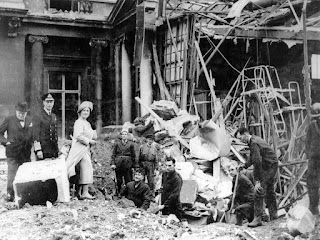Eighty years ago, the Luftwaffe hands the British a contemporary propaganda coup and a permanent day of commemoration
As though anxious to give British propaganda a second chance to make good the weak exploitation of the first bombing of Buckingham Palace, the Luftwaffe obliged again and this time there was no fumble. The King and Queen were in residence and the bombs fell close to their appartments. Queen Elizabeth immediately saw the advantage and confided, "I'm glad we've been bombed. It makes me feel I can look the East End in the face." The Royal couple were picture inspecting the damage together with the prime minister. The damage would have been even greater had one of the bombs detonated. To cap it all the Heinkel 111 which had dropped the bombs was shot down by an RAF Hurricane piloted by air ace Sgt. “Ginger” Lacey, although this was not immediately publicised.
The Battle of Britain reached a climax when the Luftwaffe staged its largest daylight raids on Britain. The day started with an unpleasant surprise for Sir Keith Park, commanding 11 Group Fighter Command, arguably the most important unit in the defence. Over breakfast his wife reminded him that it was her birthday; perhaps pardonably he had forgotten. The British broke up most of the attacks and shot down 60 of the attackers (although contemporary propaganda claim three times that number.) The 15th of September is now commemorated as Battle of Britain Day.
Throughout the Battle Bomber Command had been attacking targets in Germany in fulfilment of the RAF’s dogma that only counter-bombing offered a defence against air attack. This had proved to be false. It turned its attentions to German invasion preparations, attacking the ports of Antwerp and Dunkirk. The raid on Antwerp was especially successful and succeeded in destroying barges adapted as landing craft. In the course of the Antwerp raid Sgt. John Hannah, wireless operator on a Handley-Page Hampden suffered terrible burns fighting a fire lit by flak. He was the youngest recipient of the Victoria Cross in the Second World War.
The Battle of Britain was won when Hitler cancelled (“postponed indefinitely”) plans for Operation Sealion, the invasion of Britain. The process had begun at a Führer conference even before the repulse of 15th September. Plans for an attack on the USSR began to take shape. Hitler’s decision was not, of course, known to the British, who were not even aware of the codename Sealion. Only the gradual dispersal of the fleets of invasion barges observed by British air reconnaissance gave a clue that Sealion had been postponed, so the British remained on high alert.
Britain’s war began to broaden further when the Italians launched an invasion of Egypt, de facto a British possession, from their colony of Libya. The attack was at best half-hearted and soon came to a halt after about 100km. The British pulled back and there was no significant fighting but the distant threat to the vital Imperial artery of the Suez Canal was all too obvious.



Comments
Post a Comment